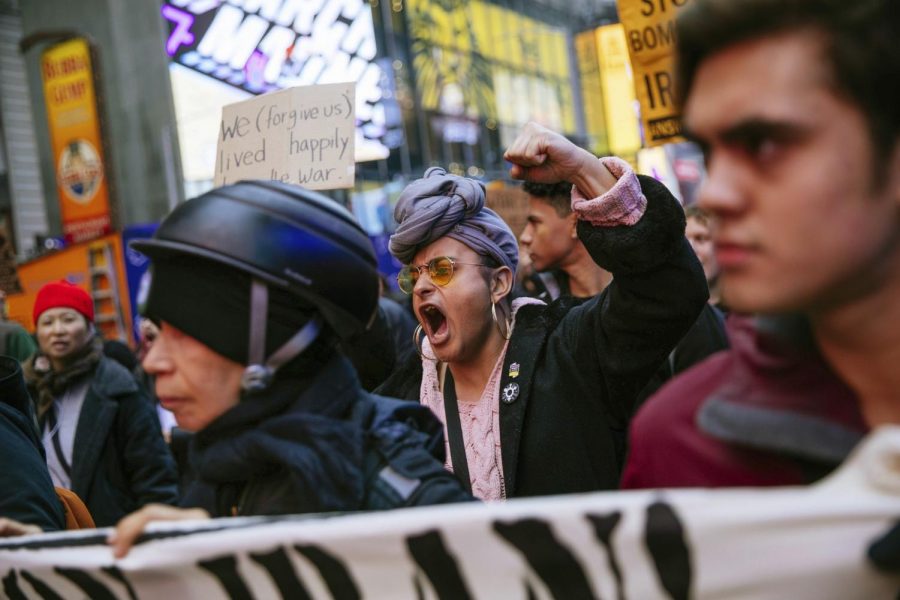Peace Committee discusses tensions between US and Iran
Activists march in Times Square to protest recent U.S. military actions in Iraq on Saturday, Jan. 4, 2020, in New York. A top Iranian general and Iraqi militiamen were killed in a U.S. airstrike that sharply escalated tensions across the region. Photo courtesy of Associated Press.
January 17, 2020
Following the Jan. 2 American drone strike that killed Iranian General Qassam Soleimani, tensions between the two countries escalated.
While the conflict was nearly 7,000 miles away, it affected some Loyola students, who gathered to share student sentiments at the Jan. 9 Peace Conference Committee.
“My first reaction was ‘here we go again,’” said criminal justice major Joseph Poublanc. “I was born in the 2000s, and we’ve always been in conflict.”
Director of Loyola’s Middle East peace minor Behrooz Moazami said these tensions trace back to the 1970’s.
“From 1979 on, we have constant friction,” Moazami said. “Our most dominant one was the hostage crisis, where Iran took 52 hostages, American hostages, for almost 400 days,”
Moazami said that the tensions have only heightened since then and cited President Trump’s decision to assassinate Soleimani as a new stressor in the Middle East conflicts.
According to the Associated Press, the assassination led to the Jan. 8 Iranian ballistic missile attack on two military bases that housed American troops in Iraq.
Brandon Tate, political science major, said the conflict “was just another event in a long list of long-running conflicts.”
Psychology major and Middle East Peace minor Ember Jetter, questioned the attack because of the role Soleimani played against the Islamic State of Iraq and Syria [ISIS].
“ISIS is against Shia [a branch of islam],” Jetter explained. He [Soleimani] was a Shia leader and had very much stayed with Shia policy, so Iranians supported him.”
Some in the Loyola community, like art and education graduate student Jennifer Novak, witnessed the global reaction.
“There was very much the idea of ‘here the Americans go again,’” Nowak said, who was in Paris when the news broke.
She explained that since the Paris attacks in 2015, Europeans have been anxious about targeting anyone who opposes ISIS. She said that killing Soleimani reinforces the stereotype of the “ignorant American.”
History major and Middle East Peace minor Brittany Giardina was hopeful for a future resolution between the two countries.
“I hope it leads more to diplomatic resolutions than militaristic ones,” Giaridina said. “After I started reading into it, I do think we’re going more toward communication or at least not all-out-war. I do think it will fizzle out.”
While student reactions appear to be mixed, they shared the opinion that the future of the conflicts in the Middle East will be impacted by the results of the November election.
“I think the whole world follows our politics,” Jetter said. “We may go to war if [Trump] gets reelected, but if he doesn’t get reelected, I think it will become more stable.”
The Associated Press contributed to this article.








